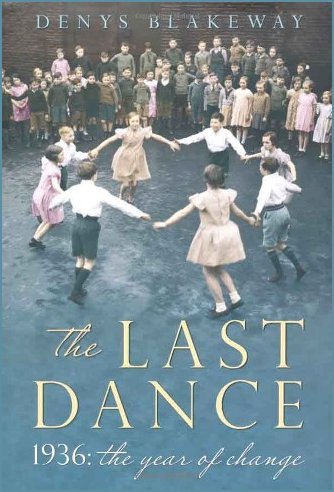Reviews
Telegraph – 'Last Dance' Review - 5:50AM BST 27 Jun 2010
The Last Dance: 1936 by Denys Blakeway:
Adam Sisman praises Denys Blakeway's The Last Dance, a study of the pivotal year in which Britain first noticed the storm clouds gathering
By Adam Sisman
 This is the latest in a sequence of recent books concentrating on a single year. Such an approach is by definition limited in scope. But it does have the merit of immediacy: showing how events appeared at the time to those experiencing them.
This is the latest in a sequence of recent books concentrating on a single year. Such an approach is by definition limited in scope. But it does have the merit of immediacy: showing how events appeared at the time to those experiencing them.
Denys Blakeway argues that 1936 was a pivotal year, when fear of war and preparation for conflict replaced domestic concerns in the minds of the British people. A storm was gathering. German troops marched into the Rhineland, in violation of the Treaty of Versailles, while a Right-wing rebellion against the republican government of Spain led to the outbreak of civil war. These ominous developments were interpreted as precursors of a wider struggle.
At home, 1936 was 'the year of three kings’, beginning with the death of George V and ending with the abdication of Edward VIII and the accession of his younger brother, who became George VI. Blakeway is especially strong on the abdication crisis. He depicts Edward VIII as a moderniser, anxious to escape from the stifling conformity imposed by his father: the first member of the Royal family for many decades to appear in public without a hat. The young King had many admirable qualities, including energy, charm, and an ability to mix easily with all classes of people. But he had little appetite for sustained work and his determination to marry 'the woman I love’ cost him his throne.
Plans for a morganatic marriage, for Mrs Simpson to become Duchess of Cornwall, came to nothing. It is a mark of how much has changed in the intervening three-quarters of a century that the British press maintained a loyal silence about the crisis until the last moment, though the King’s affair with a married woman was common knowledge among the upper classes.
Blakeway is a respected documentary film-maker with a long record of well-researched films that have often broken new ground. In The Last Dance he provides a snapshot of British society from top to bottom in this year of change. Here, for example, is Lady Hardinge, wife to the King’s private secretary, keeping a diary in French to conceal its contents from the servants; here, too, is George Orwell disgusted by the squalor and smells that he found on the Road to Wigan Pier (a portrayal for which 'Wigan would never forgive him’).
Blakeway has new things to say about even the most familiar events. He shows, for example, that the Jarrow Marchers, later iconic figures to the Left, were largely shunned by the Labour movement at the time, while they were often welcomed by the authorities in the Conservative-controlled towns through which they passed. The marchers’ discipline and stoicism earned the public’s respect, though this brought them little benefit. Plans to build a modern plant in Jarrow were stymied by the Iron and Steel Federation, which feared that it would undercut the price of steel produced from their outdated factories.
The dichotomy between tradition and modernity surfaces time and again in this skilfully written and enjoyable book. Goebbels used the 'Nazi Olympics’ in Berlin as a showcase for German technological and industrial strength. Important British visitors were encouraged to come and admire (and be intimidated by) the new Germany. The Ambassador, Joachim von Ribbentrop, was charged by Hitler with a mission to cultivate the English upper classes. He had some success: among those attracted to meet Hitler were the naive has-beens Lord Londonderry and David Lloyd George (who should have known better), the court hanger-on, 'Chips’ Channon and the absurd Mitford sisters, Unity and Diana (who referred to her Nazi guards as 'darling storms’). But the snobbish National Socialists had exaggerated the political significance of the aristocracy in Thirties Britain. In any case, Ribbentrop (nicknamed 'Herr Brickendrop’) proved an inept diplomat, almost felling George VI with a Nazi salute as the King approached to shake his hand.
Two men dominate this book: the Prime Minister, Stanley Baldwin, who recovered from nervous collapse to mastermind the Abdication crisis; and Winston Churchill, out of power and seemingly past it. His attempt to engineer a political comeback badly backfired when he misjudged the mood of the House of Commons. He had recently resumed drinking spirits after a year’s abstinence and perhaps had overindulged. His mishandling of the Abdication crisis proved paradoxically beneficial. It ensured he remained out of office and therefore untainted by the government’s appeasement policy, until the moment came to unite the nation in the dark days of 1940.
Back to Top / Back to Books Home Page / Back to Home Page
Page refreshed : 14th August 2017
